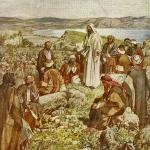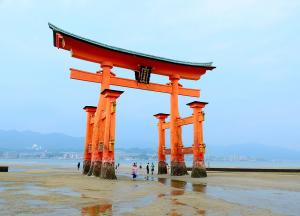 As I revealed in a post of a few weeks ago, I was privileged to be sent to several exotic locations in order to lead retreats for Air Force Chaplains. Beginning in San Antonio, TX (perhaps not so exotic, but very nice indeed!), along with Asilomar on the Monterrey peninsula of California, I then went to Germany and Japan, the latter to the Air Force Base on Okinawa. This was October of 1985, now over 32 years ago. So many of the scenes in that fascinating country are still very vivid in my mind’s eye.
As I revealed in a post of a few weeks ago, I was privileged to be sent to several exotic locations in order to lead retreats for Air Force Chaplains. Beginning in San Antonio, TX (perhaps not so exotic, but very nice indeed!), along with Asilomar on the Monterrey peninsula of California, I then went to Germany and Japan, the latter to the Air Force Base on Okinawa. This was October of 1985, now over 32 years ago. So many of the scenes in that fascinating country are still very vivid in my mind’s eye.
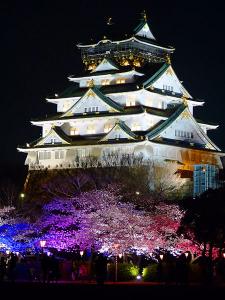 I knew very little if anything about Japan. Given my penchant for date recognition, I remembered that Admiral Perry of the US Navy had sailed into a Japanese harbor in 1865, thereby “opening” Japan to the wider world. Or so my high school history teacher proclaimed. This I know now was patently ludicrous. Japan in fact had a very long and extremely rich history dating back thousands of years. While Anazazi Native Americans were living at Chaco Canyon in modern New Mexico in stone-built structures, the wealthiest Japanese rulers were dwelling in 8-story castles of well-wrought wood, writing on paper, and using gunpowder, all these things occurring nearly 1000 years ago! Landing at the huge airport outside Tokyo, and because our plane was so late that we missed our Osaka connecting flight, we, my wife and I, were driven a fairly short distance to a hotel in the suburbs of the unimaginably large metropolis. We passed on our way the newly constructed Tokyo Disneyland, all its signs in Kanji letters, thoroughly impenetrable to either of us, though the fairy tale castle was recognizable enough. In fact, every sign we saw we had no way of reading. I felt as if we had been dropped on the surface of the moon, or perhaps better put, we had left the moon and been dropped into a roaring and amazing cauldron forming what seemed another planet. We had much to learn.
I knew very little if anything about Japan. Given my penchant for date recognition, I remembered that Admiral Perry of the US Navy had sailed into a Japanese harbor in 1865, thereby “opening” Japan to the wider world. Or so my high school history teacher proclaimed. This I know now was patently ludicrous. Japan in fact had a very long and extremely rich history dating back thousands of years. While Anazazi Native Americans were living at Chaco Canyon in modern New Mexico in stone-built structures, the wealthiest Japanese rulers were dwelling in 8-story castles of well-wrought wood, writing on paper, and using gunpowder, all these things occurring nearly 1000 years ago! Landing at the huge airport outside Tokyo, and because our plane was so late that we missed our Osaka connecting flight, we, my wife and I, were driven a fairly short distance to a hotel in the suburbs of the unimaginably large metropolis. We passed on our way the newly constructed Tokyo Disneyland, all its signs in Kanji letters, thoroughly impenetrable to either of us, though the fairy tale castle was recognizable enough. In fact, every sign we saw we had no way of reading. I felt as if we had been dropped on the surface of the moon, or perhaps better put, we had left the moon and been dropped into a roaring and amazing cauldron forming what seemed another planet. We had much to learn.
After a brief night in a Holiday-Inn sort of hotel, we went back to the airport and flew to Osaka. The plane we were in was a 747, not much in use now, that had been retrofitted to seat over 400 passengers. In those days, the Japanese people were appreciably shorter and lighter than we Americans, and so the seats were much closer together and were five in a row rather than the usual four in the middle, with three on either side. We were going to Osaka because my school, Southern Methodist University, has a sister school there called Konzei Gakuin, an undergraduate place in the bustling city. Nearly all cities in Japan are very large, because well over 80% of the land surface is reserved for parks and forestland. Hence, the people are used to living very close to one another in very large cities. When we crossed the streets in Osaka, accompanied by the familiar tune “Sakura,” we faced what seemed like 20,000 people coming at us from every corner. It was at first rather disconcerting to move among such a huge mass of people, but it did not take long to adjust to the crowds.
We were shepherded about by two English-speaking students who first took us to our house for the week. It was enormous! Unlike a typical Japanese house that was quite modest by American standards, these houses on the edge of the university were former missionary houses, and looked for all the world like English manor houses. Among other things, they had in them the largest televisions I had ever seen up to that time, playing nearly every hour the silliest game shows imaginable, involving oceans of whipped cream and screaming contestants and moderators. Our first night, we decided to stroll through the campus. As Americans, we were readily identifiable, since out of the darkness came several English phrases: “Can you take me with you back to America,” or “Would you like to join us for choir practice?” Our ultimate hosts in Osaka were Fred, a colleague of mine at the seminary, and Susy Streng; he was spending the year there as the head of the Japanese study program from SMU and his wife had joined him. They were fabulous hosts, showing us castles and stores and wonderful restaurants. Perhaps most interestingly, Susy taught us a bit of Japanese Kanji so that we could recognize which train to catch on several of our adventures. Gratefully, there were some English signs at a few of the larger stations, but to get to those you had to know some Japanese. More than once, as trains stopped and disgorged thousands of riders, we looked lost, and were saved by some kind local who spoke some English and pointed us in the right direction.
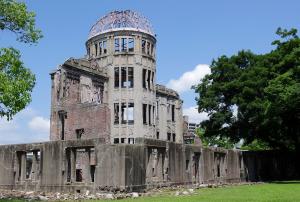 One of our trips was to me the most memorable. We caught a wonderful bullet train down south to Hiroshima in order to see the unforgettable memorial to the atomic bombing of the city in 1945. It was heartbreaking to see the devastation, the famous twisted steel dome on the skyline of the park that has been the center point of thousands of photographs. We were deeply moved, and inwardly furious, that so many were incinerated in this horrifying demonstration of our military power. As I have wondered more than a few times, could not a demonstration of the bomb’s terrible destructive might over the ocean but in sight of land not have served as well as the massacre of over 100,000 innocent Japanese? This of course has been argued over the 40 years since it happened at the time of our visit and during the ensuing 75 years since the blast.
One of our trips was to me the most memorable. We caught a wonderful bullet train down south to Hiroshima in order to see the unforgettable memorial to the atomic bombing of the city in 1945. It was heartbreaking to see the devastation, the famous twisted steel dome on the skyline of the park that has been the center point of thousands of photographs. We were deeply moved, and inwardly furious, that so many were incinerated in this horrifying demonstration of our military power. As I have wondered more than a few times, could not a demonstration of the bomb’s terrible destructive might over the ocean but in sight of land not have served as well as the massacre of over 100,000 innocent Japanese? This of course has been argued over the 40 years since it happened at the time of our visit and during the ensuing 75 years since the blast.
Though this was profoundly impactful for us, we then took a short ferry ride to the island of Miyajima, some few miles from Hiroshima. We had booked a night at a genuine Japanese Inn on the island, a wonderful place populated by skittering monkeys and various unidentifiable birds. The inn was spectacular (it cost two arms and a leg!), but we were ready for a truly local experience. It was all that and then some.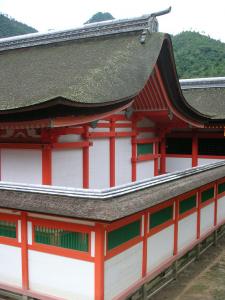
Our room was large and spare in the Japanese way, but fitted with statues and long polished wood floors. It even had its own ofuro, a soaking tub for one person at a time. But we wanted to try the large pool that always, we were told, graced all inns of this type. And so we dressed ourselves in the supplied robes and headed to the pool. There were two, one for men and one for women, because bathing was done naked. Both my wife and I proceeded to have the same experience, when we talked of it later. We both watched carefully as the local bathers soaped themselves vigorously from head to toe at individual stands, complete with mirrors and multiple kinds of lotions. We dutifully soaped up and then slipped into the very large pool. We were both the only white foreigners in the inn. As we went in, every single Japanese bather got out of the pool, leaving us alone in the water.
I have thought about that again and again in the ensuing years, and still wonder what was going on. Our hosts back in Osaka suggested that our fellow bathers were being polite by leaving the pool to us. However, one person did admit that some Japanese are still convinced that non-Japanese have objectionable body odors, and can never finally get clean, thus polluting the pool for everyone else. I have asked various Japanese acquaintances what they thought about this, but they have often dodged the question or said simply they did not know. The majority has suggested the polite answer more than any other. I suppose I will never know finally.
In the many years since this event, I have thought about it, and concluded that whatever the reason for my being left alone in that pool, it was a useful example of the huge differences that cultures present to one another. My near total ignorance of Japan was a symptom of my egregious western mindset that too often has difficulty embracing the richness of difference. We English speakers expect all the world to speak our language, and when they do not we judge them to be inferior or less accomplished than we. I live now in Los Angeles, one of the world’s most diverse cities. Every day I hear more languages spoken than I can begin to name, let alone identify. If those Japanese men got out of that pool to avoid contact with me, that offers to me a small idea of what it must be like for millions of my fellow humans who are marginalized and separated in ways I cannot begin to fathom. That event at the pool has become for me a sign of my fear of others and my unwillingness to embrace genuine difference in the human family. Unless I can do that, unless we all can do that, we doom ourselves to fear and hatred and lives of separateness and distrust. Whatever this time of year, the time of Christmas and New Year, means, surely it means that those barriers must come down.
Another three-person crew of astronauts returned to earth yesterday after a long stay on the International Space Station. During their flight they spoke to Pope Francis, who asked them what was the most memorable thing they saw while zipping around the earth again and again. One replied, not for the first time, “I looked at the earth far below and saw no borders there.” Indeed, all borders are human barriers. Those barriers must at the last come down if we are to be the human family that God had in mind at the creation of it all.
(Images from Wikimedia Commons)

